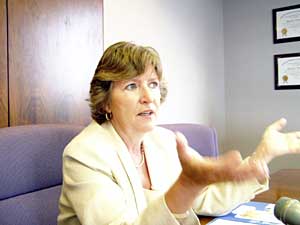Photos
More from MPR
Resources
Respond to this story
| |||||||||||||||||||||
Minnesota teachers join the call for more school funding
December 17, 2004
 |
| Judy Schaubach, president of Education Minnesota, says lawmakers must make education a higher funding priority. (MPR file photo) |
St. Paul, Minn. — Minnesota's national ranking has been slipping when you look at how much states spend on K-12 education. Judy Schaubach, president of the statewide teacher's union Education Minnesota, says in 2002, 26 states spent more than Minnesota, while a decade earlier that number was just eight. She says lawmakers must make education a higher funding priority.
 | |||
"Today in Bloomington, there are students sitting on floors in science labs because of overcrowding," Schaubach said. "In Wabasso, money is so tight that the school nurse can no longer supply tissue for kids who have runny noses. And in North Branch, elementary students are no longer screened for vision or hearing problems."
Schaubach says schools are struggling because state lawmakers held the basic, per-pupil funding formula flat the past three years. That's also made it harder for teachers to negotiate for local pay raises. Education Minnesota wants the 2005 Legislature to increase the K-12 funding formula to at least keep pace with inflation. The union also wants a long-range fix for the entire education funding system. Schaubach says school districts are now too dependent on local voters approving tax increases.
"During the 2005 session, lawmakers need to create an adequate, sustainable and predictable source of revenue for schools," Schaubach said. "This means that the Legislature must keep all options on the table regarding how the state spends money and how it takes in revenue."
One by one, education groups have been lining up to make a similar plea for more state funding. Last week, the Minnesota School Boards Association announced plans to seek at least an inflationary increase.
|
In Bloomington, there are students sitting on floors in science labs because of overcrowding. In Wabasso, money is so tight that the school nurse can no longer supply tissue for kids who have runny noses.
- Judy Schaubach, Education Minnesota |
Officials with the Association of Metropolitan School Districts say they either want an increase from the state, or the authority to ask local taxpayers for even more support.
Gov. Tim Pawlenty has said repeatedly his budget will include an increase for K-12 education. His education commissioner, Alice Seagren, says the projected state budget deficit and the governor's pledge to not raise taxes will limit the amount of the increase.
"We will try to do as much as we can for school districts this year," Seagren said. "In addition to putting money on the formula, we're going to try to do some other things that will help, allow them to spend their money more flexibly and give them some help. We're just in the middle of crafting our budget, and when the governor's ready he'll roll that out."
The union's other big push for 2005 is for passage of a statewide health insurance pool for school employees. Rising health care costs have become an increasingly contentious issue in local contract negotiations.
Education Minnesota estimates the proposed statewide system could save $223 million over the first six years of operation. Judy Schaubach says the pool could leverage affordable coverage for 200,000 people.
"We have more and more school districts that are simply at the point of not even offering group health insurance to their employees, their teachers and educational support professionals," Schaubach said.
A similar insurance pool proposal failed last year at the Legislature. The Minnesota School Boards Association has raised concerns about the potential financial impact the system could have on some school districts.
|
News Headlines
|
Related Subjects
|

